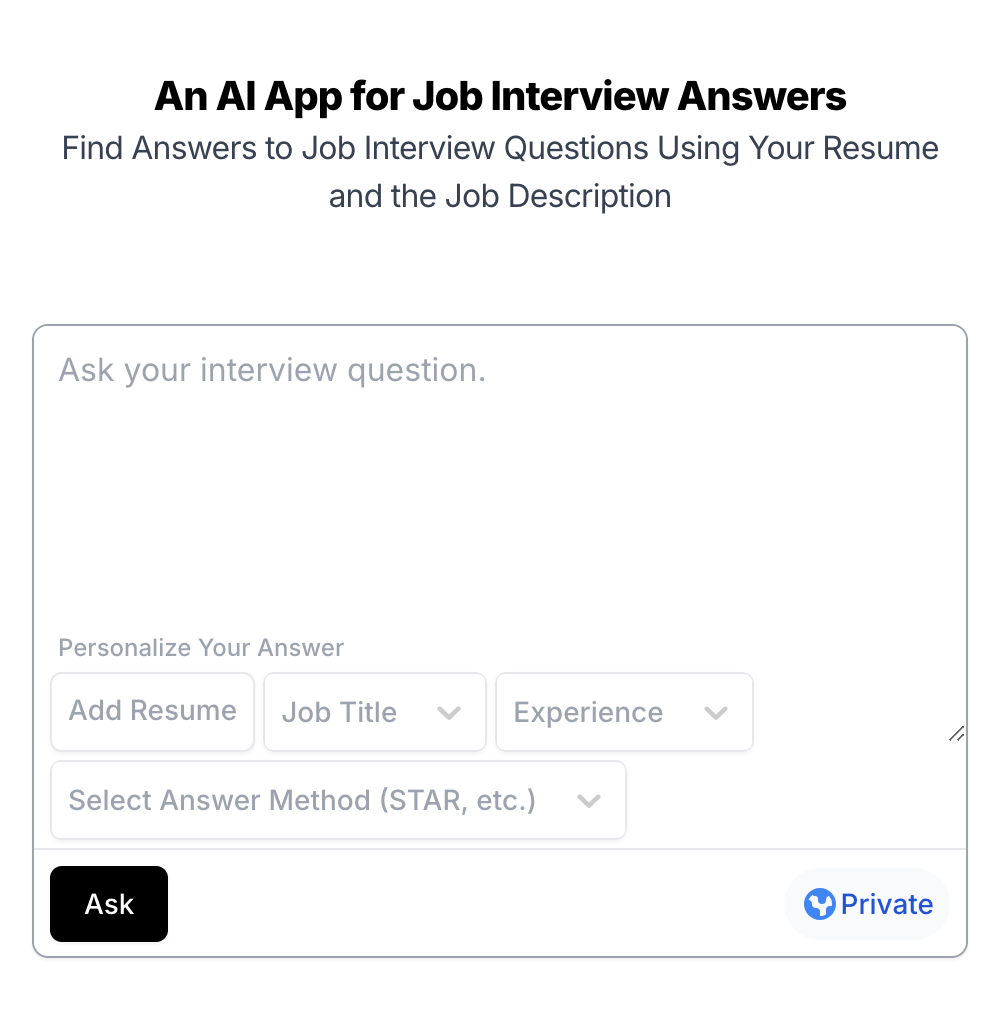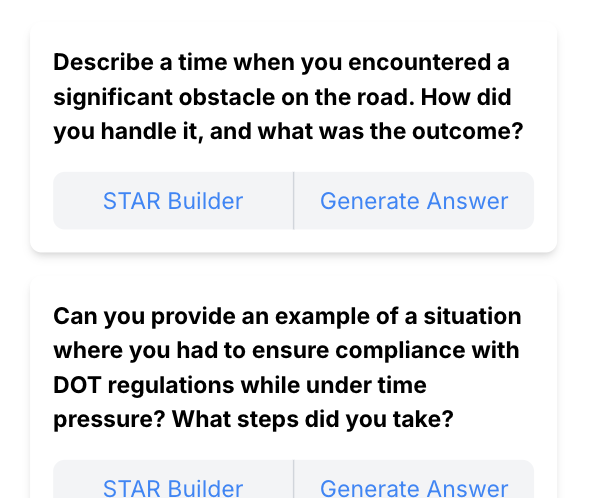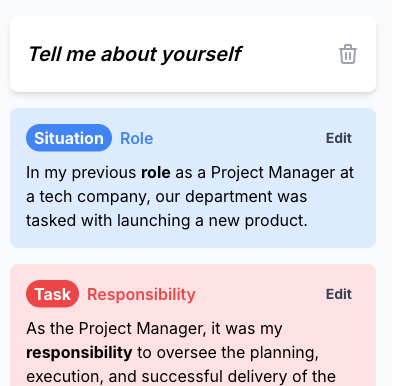
Skills-Based Interview Questions: What You Need to Know
Sat Aug 24 2024•Author: InterviewPro AI
Table of Contents
- What Are They?
- Common Examples
- Answer Length
- What to Avoid Saying
- Possible Follow-Ups
- More Follow-Up Questions
- When They're Asked
- Who Asks Them
- Why They Matter
- How to Answer Well
- Answer Structure
What Are They?
Skills-based questions ask about your specific abilities and experiences. Employers use them to see if you have the skills needed for the job. They want to know how you've used these skills in real situations.
5 Common Examples
- Can you describe a time when you had to use your problem-solving skills?
- How have you used your communication skills to resolve a conflict?
- Tell me about a project where you demonstrated your leadership abilities.
- Can you give an example of how you've used your analytical skills in a previous role?
- How have you applied your technical skills to improve a process or system?
Answer Length
Try to keep your answer to about 2-3 minutes. This gives you enough time to describe a situation, explain what you did, and share the results. Your answer shows how you've used your skills, so be specific but concise.
What to Avoid Saying
Don't say these things when answering skills-based questions:
-
Don't give vague answers Bad example: "I'm good at solving problems." (when asked about problem-solving skills) Why it's bad: This doesn't show how you've actually used the skill.
-
Don't exaggerate your abilities Bad example: "I'm the best communicator in my company." Why it's bad: This sounds boastful and may not be believable.
-
Don't focus on irrelevant skills Bad example: "I'm great at juggling." (when applying for an accounting job) Why it's bad: This doesn't relate to the job you're applying for.
-
Don't say you don't have the skill Bad example: "I've never had to use that skill before." Why it's bad: This suggests you're not qualified for the job.
-
Don't give examples unrelated to work Bad example: "I use my organizational skills to plan my vacations." Why it's bad: Work-related examples are more relevant and impressive.
-
Don't just list your skills without examples Bad example: "I'm skilled in communication, leadership, and teamwork." Why it's bad: The interviewer wants specific examples of how you've used these skills.
-
Don't blame others in your examples Bad example: "I had to use my problem-solving skills because my coworkers were incompetent." Why it's bad: This shows poor teamwork and a negative attitude.
Show that you can apply your skills effectively in professional situations.
Possible Follow-Ups
After you answer, the interviewer might ask more about your skills. They could ask about:
-
Results: They might want to know the outcome of using your skills. Example: "What was the result of applying your problem-solving skills in that situation?"
-
Challenges: They could ask about difficulties you faced while using the skill. Example: "What challenges did you encounter when leading that project?"
-
Learning: They might ask how you've improved this skill over time. Example: "How have you developed your communication skills since that experience?"
-
Application: They could ask how you'd use this skill in the new job. Example: "How would you apply your analytical skills to our current challenges?"
-
Teamwork: They might ask how your skills affect your work with others. Example: "How do your organizational skills benefit your team?"
-
Adaptability: They could ask how you'd use your skills in different situations. Example: "How would you adapt your leadership style for a remote team?"
5 More Follow-Up Questions
- "Can you give another example of how you've used this skill?"
- "How do you stay current with developments in this skill area?"
- "How do you measure the effectiveness of this skill?"
- "Have you ever had to teach this skill to someone else?"
- "How does this skill set you apart from other candidates?"
When They're Asked
You might hear these questions at different times:
-
Initial Screening: You might get basic skills questions to see if you meet job requirements. Example: "Can you describe your experience with Python programming?"
-
First Interview: This is when you'll probably get most skills-based questions, mixed with other types. Example: "Tell me about a time when you had to use your negotiation skills."
-
Technical Interviews: You might be asked to demonstrate specific technical skills. Example: "Can you write a simple algorithm to solve this problem?"
-
Panel Interviews: Different people might ask about various skills needed for the job. Example: "How have you used your project management skills in your current role?"
-
Final Interviews: You might be asked how you'd apply your skills to specific company challenges. Example: "How would you use your marketing skills to increase our market share?"
These questions can come up at any time, depending on the job requirements and the company's hiring process.
Who Asks Them
-
HR People: Example: "Can you describe how you've used your interpersonal skills in a difficult situation?"
-
Hiring Managers: Example: "How have you applied your strategic thinking skills in your current role?"
-
Team Leaders: Example: "Can you give an example of how you've used your time management skills on a complex project?"
-
Potential Coworkers: Example: "How do you use your collaboration skills when working on team projects?"
-
Technical Experts: Example: "Can you explain how you've used your coding skills to solve a specific problem?"
-
Top Managers: Example: "How have you used your leadership skills to drive organizational change?"
The person asking usually focuses on skills that are most relevant to the position you're applying for.
Why They Matter
These questions show how you've applied your skills in real situations. They give employers concrete evidence of your abilities and how you might perform in the job. They use these questions to assess if you have the right skills for the role and how effectively you can use them.
How to Answer Well
- Choose relevant examples from your experience
- Be specific about the situation and your actions
- Explain the results of using your skills
- Connect your skills to the job requirements
- Show how you've developed or improved these skills over time
Answer Structure
Use this plan to organize your thoughts:
- Situation: Briefly describe the context
- Task: Explain what you needed to do
- Action: Describe how you used your skills
- Result: Share the outcome and what you learned
Skills-based questions let you showcase your abilities and experiences. Use them to demonstrate how your skills make you a great fit for the job. Your answer helps employers understand how you can contribute to their company, so focus on showing how you've successfully applied your skills in real-world situations. Add to Conversation
Can't find what you're looking for?
Try our AI-Powered Interview Preparation Tools
Prepare for your job interview with our AI tools. Tailored answers, custom questions, and STAR method responses.


